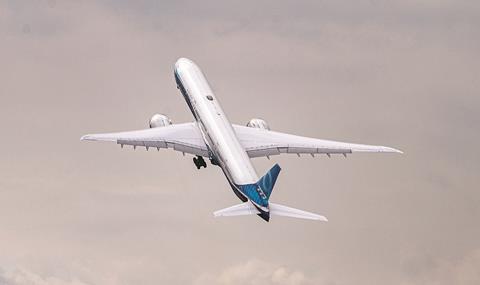Boeing has resumed 777-9 testing after pausing flight checks earlier this yr because of an unspecified downside with a GE Aerospace GE9X powerplant.
The airplane producer confirms testing has restarted, and flight monitoring websites current that one 777-9 from Boeing’s check out fleet acquired airborne on 17 December.
“Now we have now resumed airplane testing following our full safety course of and relevant mitigations whereas our suppliers and technical teams proceed their work,” Boeing tells FlightGlobal. “We’re supporting GE Aerospace as they proceed to guage a present GE9X engine downside.”

GE Aerospace says it ”continues to work rigorously with Boeing on all requirements important to help the 777X flight-test program.”
Boeing would not confirm when testing resumes, nonetheless FlightAware’s flight monitoring web page displays that Boeing’s first flight-test 777-9 – an airplane with registration N779XW – acquired airborne on 17 December.
The jet took off from Seattle’s Boeing Topic, flew east into Montana, then returned to Boeing Topic, landing about 1h 40min later, FlightAware displays.
The airplane completed an equivalent flight two days shortly 19 December.
Earlier to those flights, none of Boeing’s 4 777-9 flight-test airplane had flown for months, and the company’s three totally different 777-9 check out airplane have nonetheless not returned to the skies, in response to airplane monitoring suppliers.
A form of jets last flew in August, one last flew in July and the other last flew in November 2021, FlightAware displays.
Late last month, Boeing and GE confirmed that that they had paused the 777-9 flight-test advertising and marketing marketing campaign because of what GE often known as a “technical downside that occurred by means of the GE9X post-certification engineering testing”.
“We had a discovering all through a borescope inspection of a flight-test engine and decided with Boeing to remove the engine and ship it to our check out facility in Peebles, Ohio for engineering check out runs,” GE talked about in November. “All through these runs, a temperature alert was seen and the operator shut the engine down often.”
The engine maker added that the problem affected its “highest-time” GE9X – an engine that has gathered larger than 1,700h of run time and larger than 2,600 flight cycles.
The 777-9 program stays delayed amid heightened certification scrutiny by the US Federal Aviation Administration.
Boeing now anticipates delivering the first of the kind in 2025. The company says it continues “to talk transparently with our prospects and regulators on progress”.
Story updated on 21 December to include a comment from GE Aerospace.
